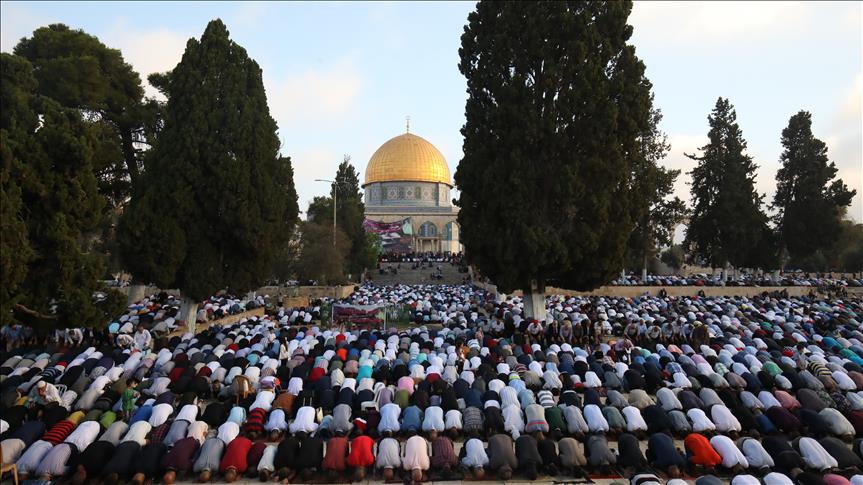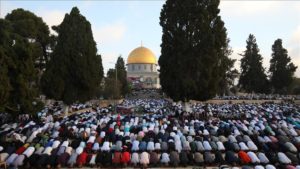In Islam, the concept of life with congregation holds significant importance. Congregation extends beyond the practice of prayer to encompass various aspects of a Muslim’s life. This concept underscores the importance of unity, cooperation, and solidarity among Muslims.
The Quran explicitly mentions the importance of congregation in Surah Ali ‘Imran, verse 103:
“Hold fast all of you to the rope of Allah and do not be divided.” This verse emphasizes that Muslims must unite and avoid division, which is the essence of congregation.
In the context of worship, congregational prayer holds immense merit. The Prophet Muhammad (peace be upon him) said in a hadith narrated by Bukhari and Muslim, “The prayer performed in congregation is twenty-seven times more virtuous than the prayer performed alone.” This hadith highlights the significance of performing prayers in congregation.
Also Read: Verses of the Universe in Gaza: The Unyielding Light of Faith
The power of congregation is also reflected in the concept of ukhuwah Islamiyah or Islamic brotherhood. The Quran states in Surah Al-Hujurat, verse 10, “The believers are but brothers.” This verse emphasizes that all Muslims form an inseparable unity.
In a broader context, congregation also includes cooperation in righteousness and piety. The Quran says in Surah Al-Maidah, verse 2:
“And cooperate in righteousness and piety, but do not cooperate in sin and aggression. And fear Allah; indeed, Allah is severe in punishment.” This verse teaches the importance of cooperation and mutual assistance in good deeds.
In a hadith narrated by Tirmidhi, the Prophet Muhammad (peace be upon him) said, “The hand of Allah is with the congregation.” This hadith indicates that Allah provides protection and support to those who unite and work together in goodness.
Also Read: Prophet Sulaiman Alaihi Salam, the Greatest Muslim King of All Time
The power of congregation is also evident in the concept of shura or consultation. The Quran mentions in Surah Ash-Shura, verse 38:
“And those who respond to their lord and establish prayer and whose affair is [determined by] consultation among themselves and from what We have provided them, they spend.” This verse highlights the importance of making decisions together.
Congregation has a positive impact on social life. The Prophet Muhammad (peace be upon him) said in a hadith narrated by Ahmad, “Whoever separates himself from the congregation by a handspan has removed himself from the bond of Islam.” This hadith emphasizes the importance of maintaining unity and cohesion among the community.
In the economic context, the power of congregation is reflected in the concepts of zakat and charity. The Quran says in Surah At-Tawbah, verse 103:
Also Read: Imaam Yakhsyallah Mansur: Surah At-Tin Indicates the Command to Liberate Al-Aqsa
“Take, [O Muhammad], from their wealth a charity by which you may purify them and cause them increase.” This verse shows that through zakat and charity, Muslims can help each other and strengthen the community’s economy.
Congregation is also crucial in the context of da’wah and spreading Islam. The Quran mentions in Surah Ali ‘Imran, verse 104:
“Let there arise from you a nation inviting to all that is good, enjoining what is right, and forbidding what is wrong; and those will be successful.” This verse teaches the importance of collectively engaging in da’wah.
The power of congregation is also evident in the practice of Hajj. The Quran mentions in Surah Al-Hajj, verse 27:
Also Read: Imaam Yakhsyallah: Nurture Love for the Prophet, One Will Be with Whom One Loves
“And proclaim to the people the Hajj. They will come to you on foot and on every lean camel coming from every distant pass.” This verse illustrates how Muslims from all over the world gather to worship together.
In the context of education, congregation plays an important role as well. The Prophet Muhammad (peace be upon him) said in a hadith narrated by Ibn Majah, “Seeking knowledge is an obligation upon every Muslim.” This hadith encourages Muslims to collectively pursue knowledge and develop understanding.
The power of congregation is also reflected in the concept of enjoining what is good and forbidding what is evil. The Quran states in Surah Ali ‘Imran, verse 110:
“You are the best nation produced [as an example] for mankind. You enjoin what is right and forbid what is wrong and believe in Allah. If only the People of the Scripture had believed, it would have been better for them. Among them are believers, but most of them are defiantly disobedient.” This verse demonstrates that Muslims should collectively uphold goodness and prevent wrongdoing.
Also Read: Friday Sermon: Emulating the Firmness of the Prophet in Struggle
Finally, the power of congregation is seen in the concept of ummah or the global Muslim community. The Quran says in Surah Al-Anbiya, verse 92:
“Indeed, this, your religion, is one religion, and I am your Lord, so worship Me.” This verse affirms that all Muslims, regardless of their race, ethnicity, or nationality, form an inseparable unity.
In conclusion, the power of congregation is deeply rooted in the Quran and Hadith. This concept spans various aspects of a Muslim’s life, including worship, social, economic, educational, and da’wah activities. Congregation not only brings spiritual benefits but also has a positive impact on communal and national life. (T/RE1/P2)
Mi’raj News Agency (MINA)
Also Read: Imaam Yakhsyallah: Muslims Unity as Key to Victory of Islam






































 Mina Indonesia
Mina Indonesia Mina Arabic
Mina Arabic